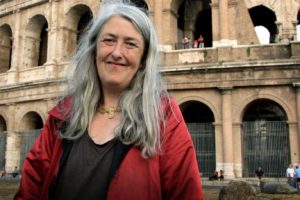Migration lessons from ancient Rome
Ancient Rome’s treatment of migrants could teach the modern world much about approaches to migration and asylum seekers, according to one of the world’s foremost experts on Roman history.

Professor Mary Beard
Professor Mary Beard says that while Rome’s repressive treatment of women as subordinates and conquered peoples as slaves would not be something we would want to emulate today, our treatment of migrants would have struck the Romans as very strange.
She says that when Rome was first founded as a city it was in need of citizens. So, notices were posted throughout the known world that Rome would accept all manner of asylum seekers, be they economic migrants, refugees, or criminals.
Professor Beard, of Cambridge University, says there was no such thing as a citizenship test or any other requirements for becoming a Roman citizen.
“No matter how barbaric Ancient Rome seems to us, its rulers would be aghast at the refugee crisis facing Europe as bodies of asylum seekers wash up on Mediterranean beaches,” she said.
Prof. Beard says understanding how a society as primitive as Ancient Rome was so welcoming to outsiders can help re-contextualize the world’s present refugee crisis.
This is especially true for nations like the United States whose foundational myth relies heavily on the right of asylum seekers (European pilgrims) to find new opportunity in new lands, she said.
“There are I have to say quite a lot of things that the Romans did extremely badly,” Prof. Beard said, writing this week in the Times Literary Supplement.
“I wouldn’t fancy being a woman in the Roman Empire. I certainly wouldn’t have fancied being a slave.
“So we can see them as offering a rather anti-model of how you should treat women and the conquered. And I think that Rome makes us think differently about some of the problems that we have and which they faced too,” Prof. Beard said.
She said one of those most obvious and relevant current problems that bore comparisons with Rome was the refugee crisis in Europe and elsewhere around the globe.
“I think… it’s very instructive to look back to Rome and to see in Rome a world where there was no such thing as an illegal migrant,” Prof. Beard said.
“That would have been absolutely incomprehensible to a Roman where there was free movement of people; where people were granted citizenship by the Romans very freely.
“There was no such thing as a citizenship test. You didn’t have to salute the flag. You didn’t have to sing the national anthem. You didn’t have to pay a fee.
“Rome was an incorporating society. And indeed when Rome thought about its very origin, and who founded Rome, they told elaborate fantastic mythical stories like the story of Romulus and Remus,” Prof. Beard said.
She said that any runaway, any criminal, any asylum seeker could come to Rome and be a Roman citizen.
“Now it’s extraordinary and perhaps rather more like some American founding myths that saw British founding myths. It’s quite extraordinary to see for me a culture which traces its origin back to migrants and refugees and asylum seekers,” Prof. Beard said.
“Now I think it’s very important to say we can’t just take that as a model of what to do ourselves. It would be slightly crazy to say oh, because Rome was an open city and welcomed asylum seekers so should we. We’re living in a different world,” she said.
“But I think what’s important is simply the realisation that there is another culture, back there, that had a very, very different view from the view that we now tend to hold.
“The Romans would look at us and they’d look at what’s happening on the beaches of Europe and the Mediterranean Sea – their world cack then. And they would be amazed and horrified just as we are horrified about some of the things that they did,” Prof. Beard said.
Mary Beard is Professor of Classics at the University of Cambridge and the classics editor of The Times Literary Supplement.
Laurie Nowell
AMES Australia Senior Journalist












